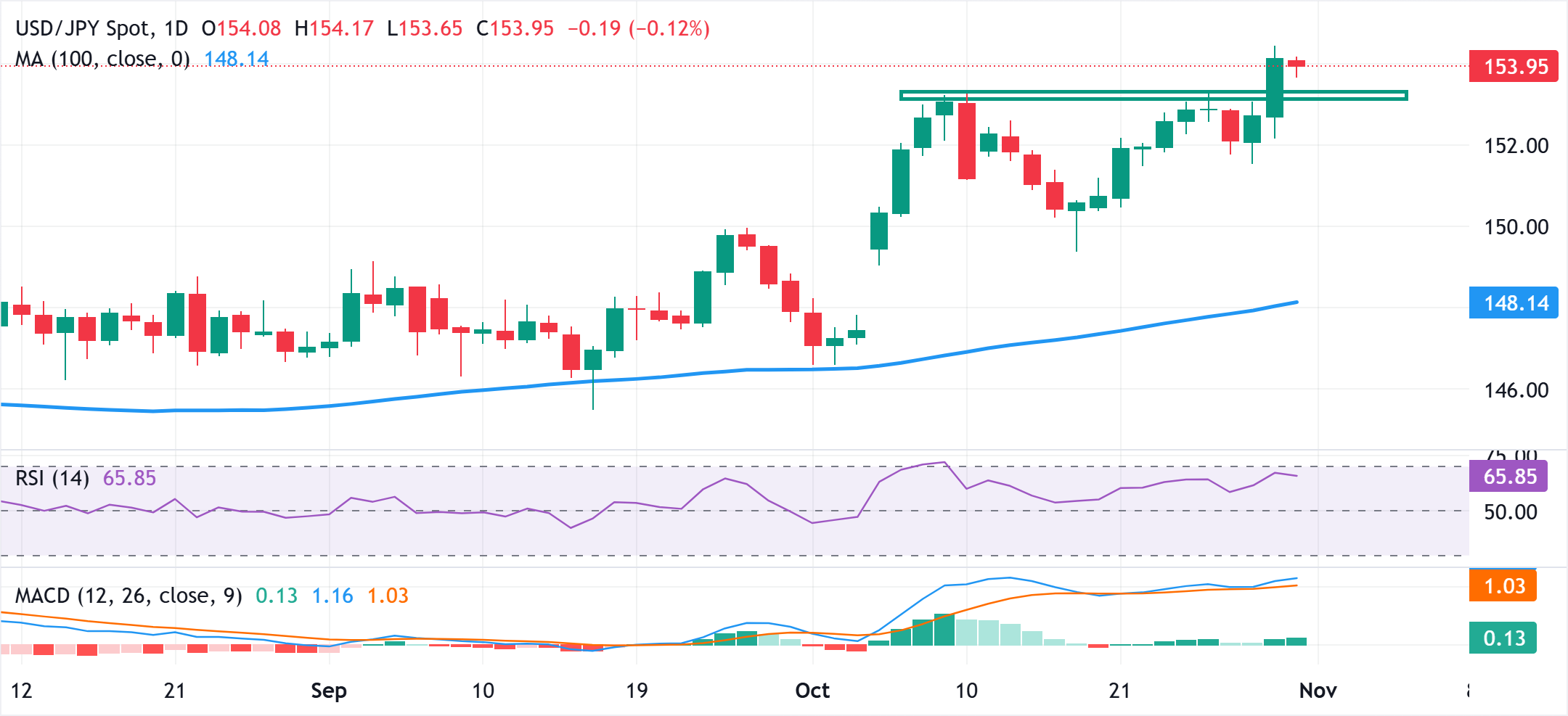Japanese Yen sticks to stronger Tokyo CPI-inspired gains; lacks follow-through buying
- The Japanese Yen attracts some buyers as the stronger Tokyo CPI print revives BoJ rate hike bets.
- The BoJ could resist policy tightening amid speculations for fiscal stimulus from the government.
- The Fed’s hawkish tilt acts as a tailwind for the USD and could lend support to the USD/JPY pair.
The Japanese Yen (JPY) strengthens during the Asian session after data released this Friday showed that inflation in Tokyo rose at a faster pace and backed the case for an imminent rate hike by the Bank of Japan (BoJ). This, along with reviving safe-haven demand, assists the JPY in recovering a part of the previous day's heavy losses. Adding to this, a subdued US Dollar (USD) demand drags the USD/JPY pair away from its highest level since February 13, around the 154.45 area, touched on Thursday.
Meanwhile, BoJ Governor Kazuo Ueda's comments on Thursday fueled uncertainty over the timing of the next rate hike amid speculations that Japan's Prime Minister Sanae Takaichi will pursue aggressive fiscal spending plans and resist policy tightening. This, along with the latest optimism led by a de-escalation of US-China trade tensions, could act as a headwind for the safe-haven JPY. Furthermore, the US Federal Reserve's (Fed) hawkish tilt favors the USD bulls and could support the USD/JPY pair.
Japanese Yen gains some positive traction following the release of stronger Tokyo CPI prints
- The internal affairs ministry reported this Friday that the Consumer Price Index in Tokyo – Japan's capital city – rose to the 2.8% YoY rate in October from 2.5% in the previous month. Adding to this, the core gauge, which excludes volatile fresh food prices, climbed from the 2.5% YoY rate in September to 2.8% during the reported month.
- Furthermore, the core CPI that excludes both fresh food and energy prices, which has stayed above the Bank of Japan's 2% target for three-and-a-half-years, rose to 2.8% from 2.5%. The data backs the case for the BoJ to keep raising interest rates gradually, which, in turn, provides a modest boost to the Japanese Yen during the Asian session.
- The BoJ held rates steady at the end of a two-day meeting on Thursday despite two dissenting votes, with board members Naoki Tamura and Hajime Takata pushing for a hike to 0.75%. Moreover, BoJ Governor Kazuo Ueda said during the post-meeting press conference that there are no preset ideas about the timing of the next rate hike.
- Moreover, Japan's new Prime Minister Sanae Takaichi's pro-stimulus stance could allow the BoJ to delay raising interest rates further, which, in turn, could act as a headwind for the JPY. The US Dollar, on the other hand, draws some support from the Federal Reserve's hawkish tilt and should contribute to limiting losses for the USD/JPY pair.
- The US central bank lowered its benchmark overnight borrowing rate for the second time this year, to a range of 3.75%-4%. However, Fed Chair Jerome Powell said that a further reduction in the policy rate at the December meeting is not a foregone conclusion. Traders were quick to react and trimmed their bets for more easing this year, which, in turn, pushed the USD to its highest level since early August on Thursday and the USD/JPY pair to an eight-month peak.
- The US government shutdown has now entered its fifth week amid a deadlock in Congress on the Republican-backed funding bill, fueling economic concerns. This is holding back the USD bulls from placing aggressive bets. Traders now look to speeches from influential FOMC members for cues about the future rate-cut path and a fresh impetus.
USD/JPY technical setup backs the case for the emergence of dip-buying at lower levels

From a technical perspective, the overnight breakout through the 153.25-153.30 region, or the previous monthly swing high, and a subsequent strength beyond the 154.00 mark, was seen as a key trigger for the USD/JPY bulls. Moreover, oscillators on the daily chart are holding comfortably in positive territory and are still away from being in the overbought zone. This, in turn, backs the case for the emergence of some dip-buying at lower levels. Nevertheless, spot prices seem poised to climb further beyond mid-154.00s, towards the 154.75-154.80 region en route to the 155.00 psychological mark.
On the flip side, weakness below the 154.00 mark is likely to find decent support and remain limited near the 153.30-153.25 resistance-turned-support. This is followed by the 153.00 round figure, which, if broken decisively, might expose the overnight swing low, around the 152.15 region. Some follow-through selling below the 152.00 mark would negate any near-term positive bias and pave the way for deeper losses towards the 151.55-151.50 area before spot prices eventually drop to the 151.10-151.00 key support.
Economic Indicator
Tokyo CPI ex Food, Energy (YoY)
The Tokyo Consumer Price Index (CPI), released by the Statistics Bureau of Japan on a monthly basis, measures the price fluctuation of goods and services purchased by households in the Tokyo region. The index is widely considered as a leading indicator of Japan’s overall CPI as it is published weeks before the nationwide reading. The gauge excluding food and energy is widely used to measure underlying inflation trends as these two components are more volatile. The YoY reading compares prices in the reference month to the same month a year earlier. Generally, a high reading is seen as bullish for the Japanese Yen (JPY), while a low reading is seen as bearish.
Read more.Last release: Thu Oct 30, 2025 23:30
Frequency: Monthly
Actual: 2.8%
Consensus: -
Previous: 2.5%
Source: Statistics Bureau of Japan







